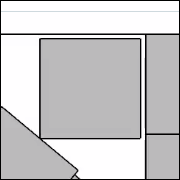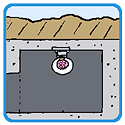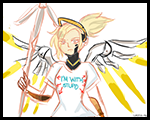|
"It hit you." "I cast Shield." "HA HA IT STILL HIT YOU! MARK OFF A SPELL SLOT, SUCKER! BETTER LUCK NEXT TIME!" ... is not an ideal DM-player interaction. (And even if the DM isn't that confrontational, it still sort of feels that way for the player.)
|
|
|
|

|
| # ? Jun 3, 2024 21:53 |
|
PeterWeller posted:Zurreco is saying that withholding the enemy's to-hit roll so the PC doesn't know whether or not Shield will work is unacceptable. Correct, though oversimplified. Mirage posted:... is not an ideal DM-player interaction. Even more correct. That situation comes off as "the monster hits because I says it does." The conversation was about where the line is between a DM withholding information for a purpose and the DM withholding information purely to punish players. The former is running the game normally, the latter is playing an adversarial role to your players. A PC should be able to appreciate that an enemy rolled a 30 to hit them because they are there in the moment on the receiving end of a very effective attack.
|
|
|
|
I'm gonna disagree on two points (and then I'm gonna stop dragging this out). The first is that I don't think withholding attack rolls is punishing players. Giving players incomplete knowledge upon which to base their choices is a fundamental part of the game. Does that mean casters sometimes waste their spell slots? Sure, but D&D is the kind of game where sometimes your action gets wasted. And, pardon me for maybe being a bit of a grog here, I think it's kinda entitled to think the DM should be calling out to-hit results so the casters knows whether or not they should cast Shield. The second is that a 30 to-hit is not actually a very effective attack (unless it's a crit). Against an AC10 opponent, the difference between a roll of 11 and a roll of 30 is nothing. Both hit. What makes an attack effective is how much damage it does and what if any status effects it inflicts. This may be further evidence that D&D would do really well to adopt levels of success, but that's a different conversation. More importantly, though, I think the DM can convey the information you want without having to give exact numbers, with stuff like, "the enemy inflicts a glancing blow," or "the enemy easily pierces your meager defenses."
|
|
|
|
PeterWeller posted:More importantly, though, I think the DM can convey the information you want without having to give exact numbers, with stuff like, "the enemy inflicts a glancing blow," or "the enemy easily pierces your meager defenses." Yeah, I'm super eager to slow down combat even further by adding embellishments to every swing of every character. Surely this is better than just showing a die roll.
|
|
|
|
Yeah, you're right. "The orc struck a glancing blow for 6 points of damage" really slows things down compared to "the orc got a 14 to hit for 6 damage." It takes a whole entire extra syllable!
|
|
|
|
I think both are valid approaches. Choose the one that suits you and your group the best. Boom.
|
|
|
|
I always tell people ACs because otherwise the game turns into them figuring it out instead of playing. It just goes all "Well, Callie missed but rolled a 22, Jack hit with a 29, we know it's in the 23-29 range, unless the monster had a magical defense up. Wait, are they doing different types of damage?" and honestly all that Scooby-Dooin' (especially keeping track of every attack roll result) takes longer and is more metagamey to me than "The Aboleth's AC is 25." "Okay." You can still work mysteries into D&D without them having to be numerical mysteries, I ain't here to play sudoku.
|
|
|
|
theironjef posted:I always tell people ACs because otherwise the game turns into them figuring it out instead of playing. Yeah this was basically my point. It's a mystery but an intensely fragile one that is solved by middle school algebra.
|
|
|
|
imagine dungeons posted:I think both are valid approaches. Choose the one that suits you and your group the best. This. I'm not saying you shouldn't tell players hit rolls; I'm just saying that withholding those numbers isn't punishing or antagonistic. theironjef posted:I always tell people ACs because otherwise the game turns into them figuring it out instead of playing. If I played with people who bogged combat by trying to figure out the AC of everything, I'd likely also just tell them the AC to speed things along. I might first remind them that knowing an enemy's AC doesn't actually improve their chances to hit.
|
|
|
|
PeterWeller posted:This. I'm not saying you shouldn't tell players hit rolls; I'm just saying that withholding those numbers isn't punishing or antagonistic. My take is that it's not punishing or antagonistic, but it's pointless. You can get mystery across while still providing the numbers. In my experience all withholding numbers creates for your players is either a desire to solve the math via clues, or a suspicion that they're being misled. In 30+ years of D&D I have never seen a player react with delight when presented with a "You don't know what the orc's attack roll was." No one's ever like "Oooh a mysterious attack roll. Mayhap he has a bonus heretofore unknown!" Instead they either get irritated or don't give a poo poo. quote:If I played with people who bogged combat by trying to figure out the AC of everything, I'd likely also just tell them the AC to speed things along. I might first remind them that knowing an enemy's AC doesn't actually improve their chances to hit. Sure it does. Can they afford to use a strike that subtracts attack bonus in exchange for damage? Do they need to spend a bunch of extra resources and effort setting up advantage?
|
|
|
|
New dungeon concept just dropped: magic door opened by solving a sudoko.
|
|
|
|
Facebook Aunt posted:New dungeon concept just dropped: magic door opened by solving a sudoko. the dungeon is a sudoko and you have to kill a certain number of goblins in each room to fill in the squares. the challenge is luring them into the the correct room
|
|
|
|
theironjef posted:My take is that it's not punishing or antagonistic, but it's pointless. You can get mystery across while still providing the numbers. In my experience all withholding numbers creates for your players is either a desire to solve the math via clues, or a suspicion that they're being misled. In 30+ years of D&D I have never seen a player react with delight when presented with a "You don't know what the orc's attack roll was." No one's ever like "Oooh a mysterious attack roll. Mayhap he has a bonus heretofore unknown!" Instead they either get irritated or don't give a poo poo. I have basically the opposite experience. In my 30 years of playing, I've never had a player take issue with me just telling them whether or not the orc hit. I don't think anyone I've played with has ever considered it a mystery in need of solving either. I'm sure there have been times when a player has asked me what an attack roll was, and aside from some time in middle school when I likely steepled my fingers and smugly replied, "that's beyond your ken, adventurer," I've told the player the number. And I don't withhold hit rolls as a rule. For example, in our last session a player cast Blur only to be immediately walloped unconscious on the next attack, and I was all, "sorry dude, I got double 18s there." quote:Sure it does. Can they afford to use a strike that subtracts attack bonus in exchange for damage? Do they need to spend a bunch of extra resources and effort setting up advantage? Fair. I was being glib and meaning it had no effect on the dice. It's definitely more information they can plan their actions around. I think maybe the difference of opinion here comes from that, aside from our time with 4E, my main group has pretty much always used TotM and never approached combat as a particularly tactical thing, so the players aren't paying great attention to the specific numbers aside from how many HP they have left and really gnarly damage rolls. Like with the points you bring up about divulging monster AC, the fighter would switch to that power attack after they saw low rolls were still hitting, and the party will try to set up advantage because it's a big bad and they're going to assume it has better than average AC. And whoever is DMing is going to imply important stuff through narration: "the aboleth's thick and slimy hide makes it very difficult to hit." So we're like the exact opposite vibe: divulging specific numbers is pointless. I don't think the way we play is superior to any other way. Well, to be fair, when I read other posters complain about how time consuming combat can be, I'm tempted to reply, "just play it loose and TotM and mother always says 'you may,'" but I wouldn't sit at anyone's table and tell them their etiquette about dice rolls (or tactical combat) was wrong. You wanna roll everything out in the open, coolness. You want the DM to roll everything behind the screen and the players don't even know their HP, coolness too.
|
|
|
|
PeterWeller posted:The second is that a 30 to-hit is not actually a very effective attack (unless it's a crit). Against an AC10 opponent, the difference between a roll of 11 and a roll of 30 is nothing. Both hit. What makes an attack effective is how much damage it does and what if any status effects it inflicts. This may be further evidence that D&D would do really well to adopt levels of success, but that's a different conversation. Eh, I dunno about this. What makes an attack effective is the impact it has on the fight, and in that sense the difference between the 11 and the non-crit 30 is large. Because the latter communicates “this creature has at least a +11 to hit” and players will approach an encounter against such a foe very differently than one which has a lower bonus. In my experience, just narrating that an enemy is tough and scary has a near 0% chance of getting the players to seriously consider fleeing a battle. Telling the players “this fight might be too tough for you” works about 50% of the time. “I’m concerned this fight will cause a TPK” works a little more often. Saying “Does a 30 hit you?” Elicits yelps of terror and instantly triggers a discussion about whether the party needs to run for any group under about 8th level almost 100% of the time. That doesn’t mean every group will flee, of course, but they’ll discuss it. And they’ll play differently for the rest of the fight if they stay in it, probably dumping every spell they’ve got in this fight. Admittedly as this is the way I’ve always done it (since 3rd edition, anyway) I might be blinkered, but I don’t feel like lines like “the enemy easily pierces your meagre defences” have the same unambiguous quality that “this guy can roll 30s!!” has. Not that the other way is wrong.
|
|
|
|
PeterWeller posted:"The demon hits." The problem isn't whether it's streamlined, it's just unfun to use a spell or ability and get told "computer says no"
|
|
|
|
It feels to me like a fragile wizard is gonna cast Shield every time he thinks he is going to be hit. A reasonable person is never going to say "That hit looks really good, I should just choose to be punched in the face rather than try to defend myself and waste a spell"
|
|
|
|
It's meant to be a fun game where you have fun. Wasting your spells and still getting hit in the head is not fun
|
|
|
|
Many of the better 1st level spells can have a chance of doing literally nothing, or effectively nothing. Most of those spells will also waste your action, and therefor effectively your turn, and not just your reaction. If there's a first level spell that's not strong enough on it's own and needs to be houseruled so this can't happen when you use it, it is not Shield. Being unsuccessful with checks, attacks or spells is part of the game. If you feel the combat is too unfair and unpredictable that you need to houserule it, that's your prerogative, but Shield isn't where I would personally start.
|
|
|
|
Hra Mormo posted:Many of the better 1st level spells can have a chance of doing literally nothing, or effectively nothing. Most of those spells will also waste your action, and therefor effectively your turn, and not just your reaction. If there's a first level spell that's not strong enough on it's own and needs to be houseruled so this can't happen when you use it, it is not Shield. All those other spells at least have someone rolling a dice to determine their success
|
|
|
|
BabyFur Denny posted:All those other spells at least have someone rolling a dice to determine their success Which is really at the core of D&D. If I roll and fail something, it might be funny, tragic or any number of things but at least I caused it. When a DM just goes "No" it sucks
|
|
|
|
In all of the campaigns I've done in 5th edition, whenever I've tried to use Shield to negate a hit, the DM would respond in one of two ways. Either, "Okay, that's a miss then," or, "It won't help, it'll still hit you even with the +5." And in the latter case, it would never use up the character's reaction and spell slot just for trying.
|
|
|
|
Azathoth posted:Yet another reason I love VTTs, no one has to deal with that bullshit. Yeah, I greatly appreciate the transparency that VTTs provide so that when I do bring out my DM bullshit the players are all able to see the chain of events/die rolls that happened behind said bullshit. All of this shield talk sounds incredibly tedious, though. I wouldn't want to play in a game where the DM tried to get you to waste resources like that.
|
|
|
|
Reveilled posted:Eh, I dunno about this. What makes an attack effective is the impact it has on the fight, and in that sense the difference between the 11 and the non-crit 30 is large. Because the latter communicates “this creature has at least a +11 to hit” and players will approach an encounter against such a foe very differently than one which has a lower bonus. Yeah, that makes sense. I can see the big number having an impact on the players' decisions. W.T. Fits posted:In all of the campaigns I've done in 5th edition, whenever I've tried to use Shield to negate a hit, the DM would respond in one of two ways. Either, "Okay, that's a miss then," or, "It won't help, it'll still hit you even with the +5." And in the latter case, it would never use up the character's reaction and spell slot just for trying. I play with people who just don't use Shield much, if at all, and I'd probably do this too if they started using Shield and getting upset when it didn't block the triggering hit. Arrrthritis posted:All of this shield talk sounds incredibly tedious, though. I wouldn't want to play in a game where the DM tried to get you to waste resources like that. This is the part I really disagree with. Not telling you in advance whether or not your spell is going to work isn't an attempt to get you to waste your slot. And even if Shield doesn't block the initial hit, it's still going to give you +5 against every other attack that comes your way before the end of your turn.
|
|
|
|
PeterWeller posted:This is the part I really disagree with. Not telling you in advance whether or not your spell is going to work isn't an attempt to get you to waste your slot. And even if Shield doesn't block the initial hit, it's still going to give you +5 against every other attack that comes your way before the end of your turn. Yep. And sometimes even when a DM does say “that 100000% won’t work” a player does it anyway. Most players I play with are people who sometimes burn resources cause it feels narratively better or is more fun than playing to the strongest outcome based on odds and math.
|
|
|
|
Reading the spell it seems like the fact that you get the AC bonus until the start of your next turn -- and thus could presumably benefit on other attacks than the one you're currently worried about "burning the spell" on -- should be a factor but probably isn't in practice since mages want to not be attacked as much as possible. In which case the spell should probably just be like "this specific single attack misses" and forget about a (semi-)ongoing AC effect; to me this doesn't seem an OP trade-off for burning a spell slot, especially against more powerful enemies with multiple attacks. I personally would side with the idea of cluing the player in on whether casting the spell would help, if only because it seems like a pretty weak spell overall. I also think there's an inherent difference between this situation and an enemy resisting a spell or another type of "miss" which is more proactive than reactive.
|
|
|
|
Guy A. Person posted:Reading the spell it seems like the fact that you get the AC bonus until the start of your next turn -- and thus could presumably benefit on other attacks than the one you're currently worried about "burning the spell" on -- should be a factor but probably isn't in practice since mages want to not be attacked as much as possible. In which case the spell should probably just be like "this specific single attack misses" and forget about a (semi-)ongoing AC effect; to me this doesn't seem an OP trade-off for burning a spell slot, especially against more powerful enemies with multiple attacks. We do it as just, "Does a 17 hit?" It's then up to the player to say yes/no or invoke a reaction to affect the hit or the damage.
|
|
|
|
Once again I want to stress "this method wastes a spell slot" is only one argument against this kind of obfuscation; the other is that the mystery doesn't last long for the effort, so some of us just don't see the value. Hell I'd be more in favor if the design ethos of 5e was "the dm rolls behind a screen and just describes the result as high, low, or middling, and players make choices based on that" at least that would actually be a mystery.
|
|
|
|
Guy A. Person posted:the spell should probably just be like "this specific single attack misses" and forget about a (semi-)ongoing AC effect  https://www.youtube.com/watch?v=o3n30CSpbPI&t=60s
|
|
|
|
Guy A. Person posted:Reading the spell it seems like the fact that you get the AC bonus until the start of your next turn -- and thus could presumably benefit on other attacks than the one you're currently worried about "burning the spell" on -- should be a factor but probably isn't in practice since mages want to not be attacked as much as possible. In which case the spell should probably just be like "this specific single attack misses" and forget about a (semi-)ongoing AC effect; to me this doesn't seem an OP trade-off for burning a spell slot, especially against more powerful enemies with multiple attacks. It gets long in the tooth with age where other spells work better, but Shield and its use as a reaction rules for mages who either find themselves in an ambush or in a battlefield scenario, where they might be basic footsoldiers or archers. Means sudden ranged attacks have a higher AC to beat, makes it more acceptable to trigger opportunity attacks while they relocate, helps avoid making CON checks for concentration, etc. A lot of benefits that help the mage more properly cast as an action later, reposition, or gtfo. Especially since it's flat AC and requires zero awareness or knowledge or sight of the thing attacking, so pretty nice for just bubbling into existence when attacked unawares by ambushers the mage caster did not even see or still cannot see. And while it burns level 1 slots, its reaction status lets casters play around with action economy pretty well in a sudden melee or ranged ambush.
|
|
|
|
Rutibex posted:the dungeon is a sudoko and you have to kill a certain number of goblins in each room to fill in the squares. the challenge is luring them into the the correct room Works for a crypt, maybe (though what are all those goblins doing in the crypt), but it seems like a bad idea for a dungeon overlord. "Thank you for your good work today installing equipment in my new torture chamber. How much do I owe you? Hmm, that's more than I'm carrying. Well, I'm lawful and you do good work, so I'll go get your money out of my vault. Stay here." *Climbs down trapped staircase* "Now how many goblins do I have to kill in this room again to open the door? Uh... six. I COMMAND SIX GOBLINS TO COME HERE IMMEDIATELY!" *Waits* "Goblins are getting slower, I may have to make an example of some of them in my new torture chamber. Ah, here they come. DIE, GOBLINS!" *Slices violently through goblins* "There, got them all, one two three four five six SEVEN?! Now I have to wait an hour for the magic to reset!" I always ironically love the adventuring locations where there's loads of traps and puzzles but also lots of foot traffic. How exactly does the torturer avoid the eighteen different traps and tricks every day on his way to work and back home again? Do you really want that trap under your bed in the middle of the night when you need to pee?
|
|
|
|
Narsham posted:Works for a crypt, maybe (though what are all those goblins doing in the crypt), but it seems like a bad idea for a dungeon overlord. Having played a lot of evil genius, the answer is that the minions are mostly disposable so you wrote off a couple killed every month as the cost of keeping your traps continually tested.
|
|
|
|
Soylent Pudding posted:Having played a lot of evil genius, the answer is that the minions are mostly disposable so you wrote off a couple killed every month as the cost of keeping your traps continually tested. This is why the best dungeon lords are also necromancers
|
|
|
|
I want to add a metacurrency to allow my PCs to essentially activate one of their npc companions and have them do something. Like an Executive Order in the Battlestar Galactica Board Game if that helps. I was going to just use inspiration and just start everyone with it every game, but can I homebrew it into DDB and have that transfer into foundry with the ddb-importer or am I asking for trouble, there.
|
|
|
|
Soylent Pudding posted:Having played a lot of evil genius, the answer is that the minions are mostly disposable so you wrote off a couple killed every month as the cost of keeping your traps continually tested. Must be an age thing. My style of evil genius is definitely trending toward setting up a hideous Dark Tower filled with traps and monsters and minions with even more dangerous foes lurking in the dungeons underneath, while actually living in a nice seaside cottage with a housekeeper and an excellent chef and telecommuting in via a Project Image spell. Worst case, you remotely detonate the Tower with the marauding adventurers inside it, rebuild somewhere else, and send some undead or fiends or elementals to remodel the Tower as a ruin filled with treasure as a nice distraction. Pro tip: find a way around divinations before you do this. There's nothing worse than pissing off the homeowner's association when a bunch of heroes peel into town because someone managed to ask the right question in a Commune spell or cast Locate Creature in just the right spot.
|
|
|
|
The evil genius is the guy who hires the party to investigate the tower, Syndrome style
|
|
|
|
Regarding monster AC, I personally use bent halves of index cards that feature the name and AC of the creature on both sides, with the side facing me having additional reminders as needed. These are arranged in order over the top of my DM screen to track initiative, too.
|
|
|
|
In todays session of our main campaign, we finally got our first PvP matches in our tournament arc, wrote up ahead of time a Death Battle intro for the other player's fights  Small snippet: quote:I'm Sorc and this is Thundertwig, and its our job to analyze their weapons, armor and skills, In my battle in order to not get one turn KO'd by the 100 hp 25 ac party warlock with a potion of freedom of movement and haste active who hits at a +15 and deals something like 25 force damage on average per bolt to my 65 hp sorcerer who lacks many combat spells choose to use Greater Invisibility to do hit and run attacks. As I can only Shield to a max of 22 AC and I can Blink 50% of the time; and Wall of Force was off the table. It's the survivability onion, I can do something so I am either in the "don't get detected" or "don't get seen" stages; I am NOT lasting very long if I am at the "Don't get Hit" stage. Sadly my damage was extremely paltry, as not only did the warlock resist fire, cold, and thunder, he often made his saves; while even just a single bolt from eldritch blast could blast off a third of my health, even with a Potion of Resistance (Force) that I did come prepared with, just not for the first round where I took at least 1 bolt I think. What the warlock would do as I circled him was to hold his action to try to Eldritch blast in my general direction as attacking even at disadvantage was still likely to hit me. So I gradually switched away from any spells that clearly indicated their origin (I could cast my spells otherwise Silently using my Psionic Soul random die ability). Eventually though he also went and hid, probably just as I determined Mind Whip/Catapult targeted his worst saves. I think legitimately this was generally fun and interesting because it was like two U-Boats going at it using AoE spells like Shatter and items like Grenades to try to find/damage people and the warlock even did something clever like throwing a rock to misdirect me away from his position But understandably it was probably excruciating to watch for the non-participating players as the DM had the god who was hosting/ref'ing the tournament to make it so the combat actually wrapped up in a reasonable time gave us like 1 round and then dispelled all of the magic on the field, and warned us that the god/ref would not be pleased if either of us went back to hiding/kiting again. Which was honestly fine because at least it dispelled the warlocks haste, things definitely got more exciting after that as it was a lot more desperate and both of us were a lot more down on resources; but he drank another freedom of movement potion so I tried instead to use a combination of mind whip, catapult, and beating him to death using telekinesis* by bashing him with nearby debris. And while this did do more damage I inevitably went down to the barrage of eldritch blast over those couple of turns. *We got Anime Rule of Cool rules in effect for the tournament, and honestly the odds were clearly stacked so hard against me I probably needed this, and it let me still Quicken off spells.
|
|
|
|
If you need an in-character reason for really high attack hits to not trigger a Shield, its pretty easy to imagine that a high attack roll represents an attack so fast or unexpected that you can't even get a reaction off before getting hit. You can still raise Shield after getting hit if you want (ie the +5 AC to subsequent attacks) but that is the way to make it clear that a Shield won't protect you from getting hit without also giving away numbers if you don't want to.
|
|
|
|
Ravenfood posted:If you need an in-character reason for really high attack hits to not trigger a Shield, its pretty easy to imagine that a high attack roll represents an attack so fast or unexpected that you can't even get a reaction off before getting hit. You can still raise Shield after getting hit if you want (ie the +5 AC to subsequent attacks) but that is the way to make it clear that a Shield won't protect you from getting hit without also giving away numbers if you don't want to.  
|
|
|
|

|
| # ? Jun 3, 2024 21:53 |
|
I haven't read much beyond the briefest of skims so can't tell you good/bad it is, but Monte Cook made a plane of existence which is pretty much Minecraft. It's from Path of the Planebreaker, a kind of planar sequel to Beyond Countless Doorways:
|
|
|







































